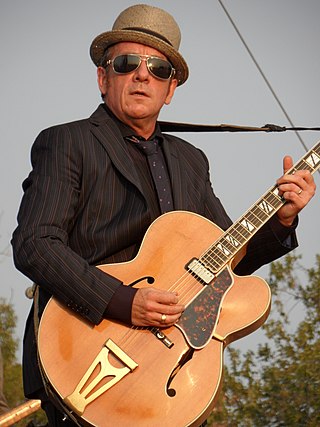
Declan Patrick MacManus, known professionally as Elvis Costello, is an English singer, songwriter, record producer, author and television presenter. According to Rolling Stone, Costello "reinvigorated the literate, lyrical traditions of Bob Dylan and Van Morrison with the raw energy and sass that were principal ethics of punk", noting the "construction of his songs, which set densely layered wordplay in an ever-expanding repertoire of styles." His first album, My Aim Is True (1977), is widely regarded as one of the best debuts in popular music history. It spawned no hit singles, but contains some of Costello's best-known songs, including the ballad "Alison". Costello's next two albums, This Year's Model (1978) and Armed Forces (1979), recorded with his backing band the Attractions, helped define the new wave genre. From late 1977 through early 1980, each of the eight singles he released reached the UK Top 30. His biggest hit single, "Oliver's Army" (1979), sold more than 400,000 copies in Britain. He has had more modest commercial success in the US, but has earned much critical praise. From 1977 through the early 2000s, Costello's albums regularly ranked high on the Village Voice Pazz & Jop critics' poll, with This Year's Model and Imperial Bedroom (1982) voted the best album of their respective years. His biggest US hit single, "Veronica" (1989), reached number 19 on the Billboard Hot 100.
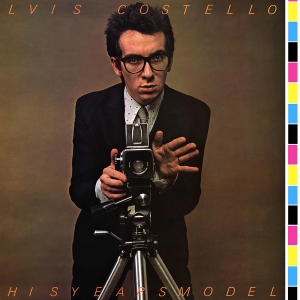
This Year's Model is the second studio album by the English singer-songwriter Elvis Costello, released on 17 March 1978 through Radar Records. After being backed by Clover for his debut album My Aim Is True (1977), Costello formed the Attractions—keyboardist Steve Nieve, bassist Bruce Thomas and drummer Pete Thomas —as his permanent backing band. Recording sessions took place at London's Eden Studios in eleven days between late 1977 and early 1978. Nick Lowe returned as producer, and Roger Béchirian acted as engineer. Most of the songs were written prior to the sessions, and debuted live during the latter half of 1977.
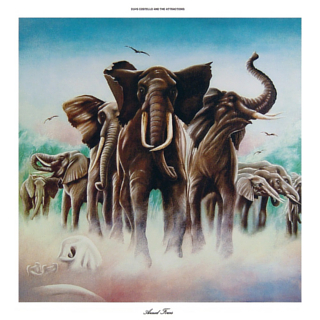
Armed Forces is the third studio album by the English singer-songwriter Elvis Costello, released on 5 January 1979 in the United Kingdom through Radar Records. It was his second album with the Attractions—keyboardist Steve Nieve, bassist Bruce Thomas and drummer Pete Thomas —and the first to officially credit them on the cover. The album was recorded in six weeks from August to September 1978 in London under the working title Emotional Fascism. Produced by Nick Lowe and engineered by Roger Béchirian, the sessions saw Costello exert more control over production compared to This Year's Model, while Nieve contributed more to song arrangements.

Get Happy!! is the fourth studio album by the English singer-songwriter Elvis Costello, and his third with the Attractions — keyboardist Steve Nieve, bassist Bruce Thomas and drummer Pete Thomas. It was released on 15 February 1980 through F-Beat Records in the United Kingdom and Columbia Records in the United States. Produced by Nick Lowe and engineered by Roger Béchirian, the sessions began in London but moved to the Netherlands after Costello found the material derivative of his previous album, Armed Forces (1979). The sessions were problematic but resulted in a large number of songs; the final album contains 20 tracks across a single LP.
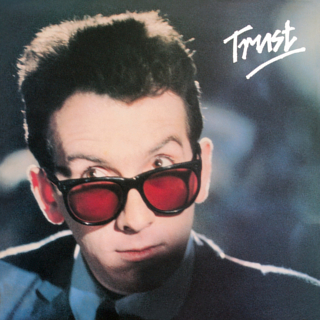
Trust is the fifth studio album by the English singer-songwriter Elvis Costello, and his fourth with the Attractions—keyboardist Steve Nieve, bassist Bruce Thomas and drummer Pete Thomas. It was released on 23 January 1981 through F-Beat Records in the United Kingdom. His fifth consecutively produced album by Nick Lowe, who was assisted by engineer Roger Béchirian, the album was recorded in London from October to November 1980 between DJM and Eden Studios. The sessions were riddled with alcohol and drug issues and tensions were high between the band members. Squeeze vocalist Glenn Tilbrook and the Rumour guitarist Martin Belmont made guest appearances on "From a Whisper to a Scream".
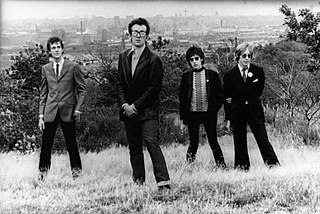
The Attractions were an English backing band for the English new wave musician Elvis Costello between 1977 and 1986, and again from 1994 to 1996. They consisted of Steve Nieve (keyboards), Bruce Thomas, and Pete Thomas (drums). They also released one album as an independent entity, without Costello, in 1980.

"Oliver's Army" is a song written by Elvis Costello and performed by Costello and the Attractions, from the former's third studio album Armed Forces (1979). The song is a new wave track that was lyrically inspired by the Troubles in Northern Ireland and includes lyrics critical of the socio-economic components of war. Costello had travelled to Northern Ireland and was influenced by sights of British soldiers patrolling Belfast. Musically, the song features a glossy production and a keyboard performance inspired by ABBA, creating a juxtaposition between the lyrics and music that both critics and Costello have pointed out.

"Radio Radio" is a song written by Elvis Costello and performed by Elvis Costello and the Attractions. The song originated as a Bruce Springsteen-inspired song called "Radio Soul" that Costello had written in 1974. In 1977, Costello reworked the song to feature a more aggressive arrangement and more direct, sarcastic lyrics that criticised the commercialism of British radio. Costello and the Attractions recorded the song around the time of his second album, This Year's Model.
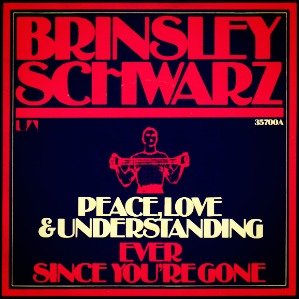
"(What's So Funny 'Bout) Peace, Love, and Understanding" is a 1974 song written by English singer/songwriter Nick Lowe. Initially released by Lowe with his band Brinsley Schwarz on their 1974 album The New Favourites of... Brinsley Schwarz, the song was released as a single and did not chart.

The discography of the English singer-songwriter Elvis Costello includes 33 studio albums, 6 live albums, 17 compilation albums, 6 tribute albums, 2 extended plays, 62 singles and 4 box sets. This page distinguishes between United States and United Kingdom release dates and record labels. Of note are the reissue series, Costello's back catalogue having undergone reissue three times by three different companies.

The Best of Elvis Costello and the Attractions is a compilation album by English musician Elvis Costello and his backing band the Attractions, released in 1985. It was the first of what would be many career-spanning compilation albums of previously released material for Costello.

"Pump It Up" is a 1978 song by Elvis Costello and the Attractions. It originally appeared on Costello's second album This Year's Model, which was the first he recorded with the backing group the Attractions. Written as an ironic response to his time during the Stiffs Live Tour and inspired by "Subterranean Homesick Blues" by Bob Dylan, "Pump It Up" features a stomping rhythm and ironic lyrics.

"Accidents Will Happen" is a song written by Elvis Costello and performed by Elvis Costello and the Attractions. It first appeared on the 1979 album Armed Forces. Costello wrote the song about his many infidelities during this period of his life, including an encounter Costello had with a taxi driver in Tucson, Arizona. The song originally featured a piano-centered arrangement and was inspired by songs such as "Anyone Who Had a Heart" and "Walk Away Renée".

"Man Out of Time" is a song written by new wave musician Elvis Costello and performed by Elvis Costello and the Attractions on their 1982 album, Imperial Bedroom. With lyrics detailing a political scandal, "Man Out of Time" features a lush arrangement that was a conscious departure from the aggressive style of Costello's previous work.

"Watching the Detectives" is a 1977 single by English singer-songwriter Elvis Costello. Inspired by the Clash and Bernard Herrmann, the song features a reggae beat and cynical lyrics.

"(I Don't Want to Go to) Chelsea" is a song written by new wave musician Elvis Costello and recorded by Costello with his backing band the Attractions. The song appeared on Costello's 1978 second album, This Year's Model. Written by Costello while working as a computer programmer, the song was lyrically inspired by films Costello had been watching as well as childhood trips to Chelsea. Musically the song featured influence from bands such as the Who and the Kinks and is notable for Bruce Thomas's prominent bassline.

"Sulky Girl" is a song written and performed by new wave musician Elvis Costello that was first released on his 1994 album Brutal Youth. The song was one of those on the album that featured Costello performing with his longtime backing band the Attractions, who reunited during the course of the album's recording. As such, Costello singled out the song as an instance of the band's ability to play loudly and aggressively.

"I Want You" is a song written by Elvis Costello and recorded with his backing band the Attractions. It was released on his 1986 album Blood & Chocolate.
"Senior Service" is a song written by new wave musician Elvis Costello and performed by Elvis Costello and the Attractions for their 1979 album Armed Forces. Featuring a danceable arrangement inspired by David Bowie, the song includes punning lyrics referencing the cigarette brand of the same name and decrying the effects of the elderly on the British welfare system.

"Beyond Belief" is a song written by new wave musician Elvis Costello and recorded by Costello with his backing band the Attractions. The song appeared on Costello's 1982 album, Imperial Bedroom. With vague, hazy lyrics, "Beyond Belief" features an active drum line from a hungover Pete Thomas as well as a frantic vocal line Costello composed after the backing track was completed.



















